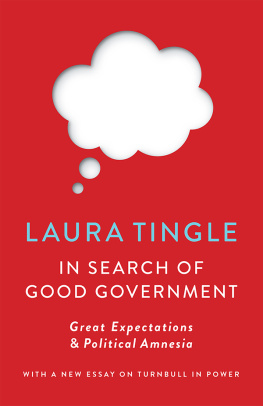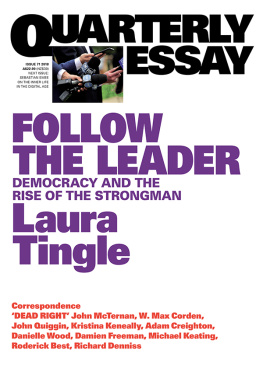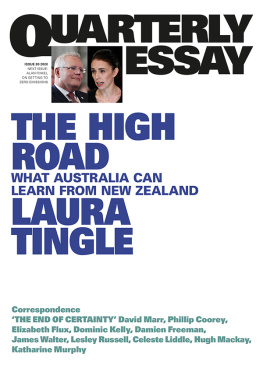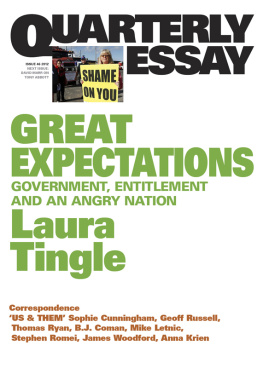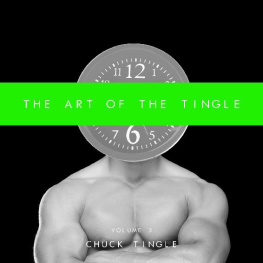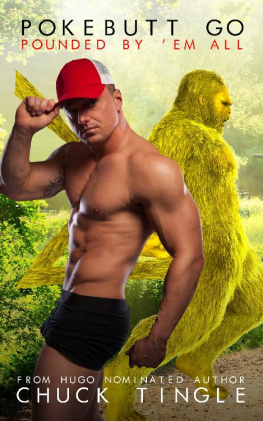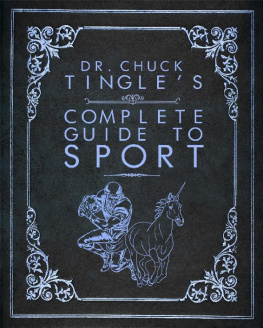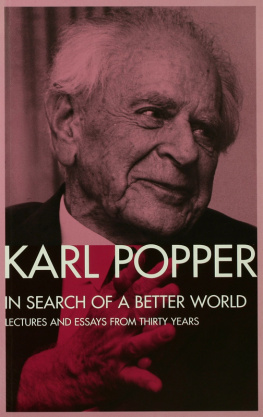Published by Black Inc.,
an imprint of Schwartz Publishing Pty Ltd
Level 1, 221 Drummond Street
Carlton VIC 3053, Australia
www.blackincbooks.com
Copyright Laura Tingle 2012, 2015, 2017
Great Expectations previously published as Quarterly Essay 46.
Political Amnesia previously published as Quarterly Essay 60.
This revised edition published 2017.
Laura Tingle asserts her right to be known as the author of this work.
ALL RIGHTS RESERVED.
No part of this publication may be reproduced, stored in a retrieval system, or transmitted in any form by any means electronic, mechanical, photocopying, recording or otherwise without the prior consent of the publishers.
National Library of Australia Cataloguing-in-Publication entry:
Tingle, Laura, author.
In search of good government: great expectations
& political amnesia / Laura Tingle.
9781863959285 (paperback)
9781925435634 (ebook)
Turnbull, Malcolm, 1954
Political cultureAustralia.
PoliticiansAustraliaPublic opinion.
AustraliaPolitics and governmentPublic opinion.
Cover design by Peter Long
Text design by Tristan Main
Typesetting by Duncan Blachford
Introduction
R ome, October 2009. It was suddenly cold in the eternal city. Only a few weeks earlier I had taken a photo of our daughter, Tosca, standing in the heat of an Indian summer, smiling in her little girls cotton shift, in front of the Pantheon.
At home, in the political world, the temperature had also suddenly changed. In fact, climate change itself meant that the beginning of the end of Malcolm Turnbulls leadership of the Liberal Party was looming, although not yet in sight. In a couple of months, the Copenhagen climate change conference would destroy Kevin Rudds remaining hold on the climate debate and ultimately help to destroy his leadership of the Labor Party.
Tosca and I had escaped all this, leaving father and husband behind for an excellent girls adventure in Italy. There had been hot, bright days in the countryside and among the ruins and umbrella pines. Now it was Saturday night in a chilly and wet Rome. Normally, we walked or caught buses around Rome, but our destination on this night one of Romes more distant hills saw us competing for a taxi among the crowds at the end of Piazza Navona.
Abruptly we were seeing Rome as many tourists only see it: in terms of its hustling, excitable traffic. Toscas fingers dug into my arm as we weaved wildly through cars that were all defining their own laneways through the wet streets.
Amanda Vanstone former senator, former Howard government cabinet minister was the Australian ambassador to Italy. I had known Vanstone when she was in Canberra and liked her. We werent particularly close. She wasnt a great fizz, as journalists like to describe good sources, but I had always marvelled at her capacity to survive the Howard era as one of the few Liberal wets. He moved her in and out of cabinet, into all sorts of testing jobs. She did them without complaint, secretly relishing the times when she could get some policy shift past her boss. She always had a sharp and quirky eye for the workings of human nature. Now she was our representative in a country whose volatile and chaotic modern-day politics leave many Australians both perplexed and smug.
In response to an email asking if she could fit in a cup of tea, Amanda had extended a kind invitation to join her and her husband, Tony, for dinner. We talked of things Italian and Australian as the Vanstones dog, Gus, lolloped about, refusing to live up to his reputation for biting guests. The Vanstones brought to the conversation both the detached clarity and intense interest of those who are living far from home.
We pondered the prospects of Malcolm Turnbull perhaps the last hope of the small-l liberals and we spoke of the much-maligned traffic after our hair-raising taxi ride across the city. To our surprise, we found ourselves agreeing that despite their reputation, Italian drivers were not as aggressive as those in Australia. Italian drivers looked for their opportunities. Everyone expected no less of everyone else. But they didnt deliberately speed up to cut you off as people do in Australia.
Yes, but you see Ive always thought Australians had an inbuilt angry streak, Vanstone observed.
Angry? All the clichs about Australia go to our easygoing natures. Happy-go-lucky, no worries, shell be right. It had never occurred to me to think of Australians as an angry people. We might be moaners and whingers, but angry?
We think of the Mediterranean cultures as hot-blooded and hot-tempered, yet here we were in the centre of one of the oldest civilisations in the world, discussing how people on an everyday level got on with each other, manoeuvred around each other, so that everybody could get where they wanted to go.
We had just come out of a decade in which the countrys political leader said he wanted us all to be comfortable and relaxed, and, later, alert but not alarmed. Yet Vanstones comment stayed with me, perhaps because I was so regularly reminded of it even in the relatively sedate traffic of Canberra: so many people stubbornly refusing to give way when they could. Why should they let someone else get ahead? Australians might not like to yell and confront each other, we might not gesticulate colourfully, but we find other ways to assert ourselves.
This, of course, was before Tony Abbotts rise to the leadership of the Liberal Party, and before the June 2010 coup that toppled Rudd and injected a new level of anger into our political discourse.
Someone, it seems, is always in the process of letting us down or telling us a lie. No one in politics is allowed to change their mind, or even adapt to new circumstances, anymore. In the day-to-day political discourse, this is put down purely to bad politics, badly conducted. But are we also getting angrier as a society?
When I went back to Vanstone in late 2011 and asked her why Australians are so angry, she replied that it is because they have expectations that have not been met and a belief in entitlements they are due.
The more I thought on it, the more it seemed that so much of our culture, so many of our public discussions, contain some suspicion or assertion that we might be being ripped off, that someone else might be getting preferment. The belief that we are entitled to a lifestyle that we think everyone else may be enjoying seems to simmer not far beneath the surface.
A most conspicuous example of this is the way the debate about asylum seekers plays out: the swirling myths that people who arrive by boat are handed a goodie bag of entitlements as they step ashore.
The simmering suspicion is not a new phenomenon. But maybe it is a defining one that we are yet to acknowledge in ourselves. In his book Convict Society and Its Enemies, the historian John Hirst documents what he rightly says is perhaps in all our writings an un-bettered account of this aspect of Australian society. In 1839, during a heated debate on the future of convict transportation and self-government, a correspondent for the Sydney Herald wrote about the harshness of the relationships within the small but growing community. The Herald


